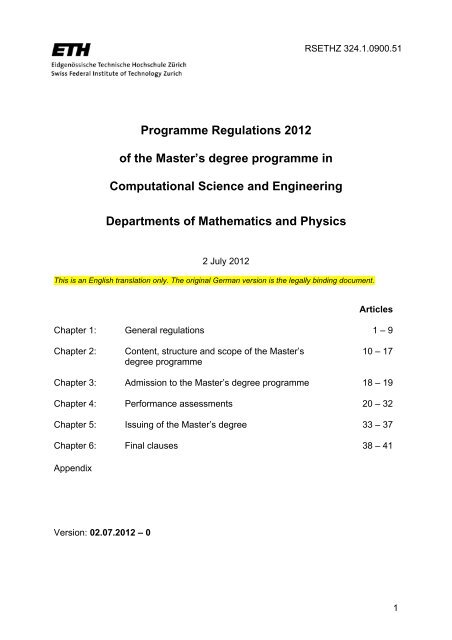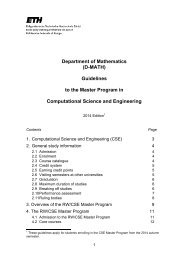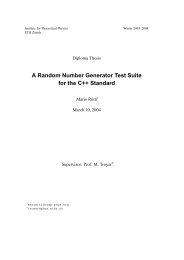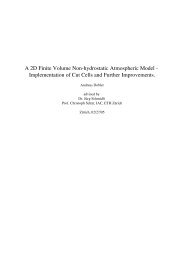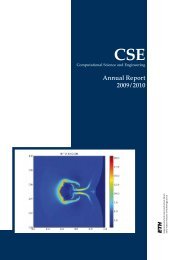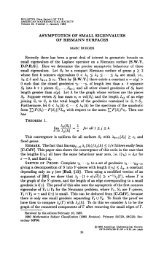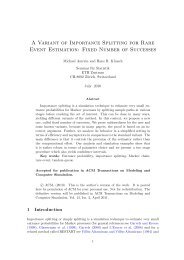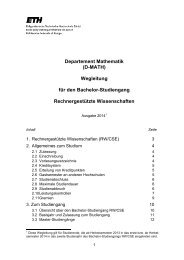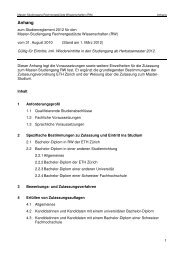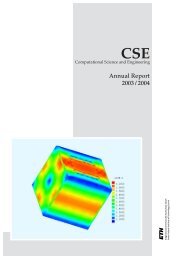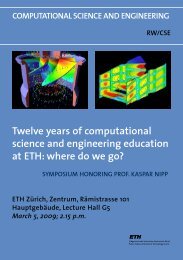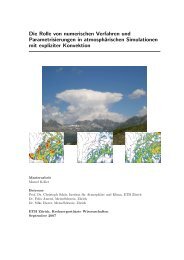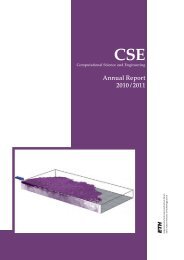Programme Regulations 2012 of the Master's degree ... - ETH Zürich
Programme Regulations 2012 of the Master's degree ... - ETH Zürich
Programme Regulations 2012 of the Master's degree ... - ETH Zürich
You also want an ePaper? Increase the reach of your titles
YUMPU automatically turns print PDFs into web optimized ePapers that Google loves.
RS<strong>ETH</strong>Z 324.1.0900.51<br />
<strong>Programme</strong> <strong>Regulations</strong> <strong>2012</strong><br />
<strong>of</strong> <strong>the</strong> Master’s <strong>degree</strong> programme in<br />
Computational Science and Engineering<br />
Departments <strong>of</strong> Ma<strong>the</strong>matics and Physics<br />
2 July <strong>2012</strong><br />
This is an English translation only. The original German version is <strong>the</strong> legally binding document.<br />
Articles<br />
Chapter 1: General regulations 1 – 9<br />
Chapter 2:<br />
Content, structure and scope <strong>of</strong> <strong>the</strong> Master’s<br />
<strong>degree</strong> programme<br />
10 – 17<br />
Chapter 3: Admission to <strong>the</strong> Master’s <strong>degree</strong> programme 18 – 19<br />
Chapter 4: Performance assessments 20 – 32<br />
Chapter 5: Issuing <strong>of</strong> <strong>the</strong> Master’s <strong>degree</strong> 33 – 37<br />
Chapter 6: Final clauses 38 – 41<br />
Appendix<br />
Version: 02.07.<strong>2012</strong> – 0<br />
1
<strong>Programme</strong> <strong>Regulations</strong> <strong>2012</strong> <strong>of</strong> <strong>the</strong><br />
Master’s <strong>degree</strong> programme in Computational Science and<br />
Engineering<br />
Departments <strong>of</strong> Ma<strong>the</strong>matics and Physics<br />
2 July <strong>2012</strong> (Version: 2 July <strong>2012</strong>)<br />
___________________________________________________________________<br />
This is an English translation only. The original German version is <strong>the</strong> legally binding document.<br />
The <strong>ETH</strong> Zurich Executive Board,<br />
pursuant to Art. 4, Para. 1, Subpara. a <strong>of</strong> <strong>the</strong> <strong>ETH</strong> Zurich Organisational Ordinance<br />
(Organisationsverordnung <strong>ETH</strong> Zürich) <strong>of</strong> 16 December 2003, (1<br />
decrees:<br />
Chapter 1:<br />
General regulations<br />
Part 1:<br />
General<br />
Art. 1<br />
Subject and scope, Appendix<br />
1 These <strong>Programme</strong> <strong>Regulations</strong> set out <strong>the</strong> requirements according to which <strong>the</strong><br />
Master’s <strong>degree</strong> in Computational Science and Engineering (CSE) at <strong>the</strong> <strong>ETH</strong> Zurich<br />
Departments <strong>of</strong> Ma<strong>the</strong>matics and Physics (D-MATH/D-PHYS) may be acquired.<br />
2 The Appendix is a part <strong>of</strong> <strong>the</strong>se <strong>Programme</strong> <strong>Regulations</strong>. Any changes to <strong>the</strong><br />
Appendix are subject to <strong>the</strong> approval <strong>of</strong> <strong>the</strong> Rector.<br />
Art. 2<br />
Academic title<br />
1 Graduates <strong>of</strong> <strong>the</strong> <strong>ETH</strong> Zurich Master’s <strong>degree</strong> programme in Computational<br />
Science and Engineering are awarded <strong>the</strong> academic title<br />
(in German) Master <strong>of</strong> Science <strong>ETH</strong> in Rechnergestützten Wissenschaften<br />
(abbreviation: MSc <strong>ETH</strong> RW)<br />
2 The English form <strong>of</strong> this title is<br />
Master <strong>of</strong> Science <strong>ETH</strong> in Computational Science and Engineering<br />
(abbreviation: MSc <strong>ETH</strong> CSE)<br />
3 This title may also be used in <strong>the</strong> abbreviated form ‘MSc <strong>ETH</strong>’.<br />
1 RS<strong>ETH</strong>Z 201.021<br />
2
Art. 3<br />
Legal basis<br />
These <strong>Programme</strong> <strong>Regulations</strong> are based upon <strong>the</strong> stipulations set out in <strong>the</strong><br />
following legal documents:<br />
a. Ordinance on Course Units and Performance Assessments at <strong>ETH</strong> Zurich<br />
(Verordnung über Lerneinheiten und Leistungskontrollen an der <strong>ETH</strong> Zürich;<br />
hereafter VLK <strong>ETH</strong> Zürich) <strong>of</strong> 10 September 2002 (2<br />
b. Ordinance Concerning Admission to Study <strong>Programme</strong>s at <strong>ETH</strong> Zurich<br />
(Verordnung über die Zulassung zu den Studien an der <strong>ETH</strong> Zürich; hereafter<br />
Admissions Ordinance <strong>ETH</strong> Zurich) <strong>of</strong> 30 November 2010 (3<br />
Art. 4<br />
Course Catalogue<br />
1 D-MATH/D-PHYS lists <strong>the</strong> course units <strong>of</strong> <strong>the</strong> <strong>degree</strong> programme in <strong>the</strong> Course<br />
Catalogue. This list is binding.<br />
2 Details <strong>of</strong> <strong>the</strong> course information to be listed in <strong>the</strong> Course Catalogue are set out in<br />
Art. 4 <strong>of</strong> <strong>the</strong> <strong>ETH</strong> Zurich Ordinance on Performance Assessments (VLK <strong>ETH</strong> Zurich) (4<br />
and in <strong>the</strong> corresponding implementation rules issued by <strong>the</strong> Rector.<br />
Part 2:<br />
Credit system<br />
Art. 5<br />
Policy<br />
1 The <strong>degree</strong> programme follows a credit system which is aligned with <strong>the</strong> European<br />
Credit Transfer System (ECTS).<br />
2 <strong>ETH</strong> Zurich deploys <strong>the</strong> ECTS in accordance with <strong>the</strong> Credit System Guidelines<br />
(Richtlinien zum Kreditsystem). (5<br />
Art. 6<br />
Credits, basis for calculation<br />
1 Credits describe <strong>the</strong> average time expenditure required to achieve a learning goal.<br />
2 One credit corresponds to a workload <strong>of</strong> 30 hours. This workload comprises all <strong>of</strong><br />
<strong>the</strong> study-related activities required to obtain said credit.<br />
3 The curriculum is designed such that full-time students may obtain an average <strong>of</strong> 30<br />
credits per semester.<br />
2 SR 414.135.1, RS<strong>ETH</strong>Z 322.021<br />
3 SR 414.131.52, RS<strong>ETH</strong>Z 310.5<br />
4 SR 414.135.1, RS<strong>ETH</strong>Z 322.021<br />
5 See www.rektorat.ethz.ch/directives.<br />
3
Art. 7<br />
Allocation <strong>of</strong> credits<br />
1 D-MATH/D-PHYS allocates a certain number <strong>of</strong> credits to each <strong>of</strong> <strong>the</strong> course units it<br />
<strong>of</strong>fers.<br />
2 If an <strong>ETH</strong> Zurich course unit is found on <strong>the</strong> curriculum <strong>of</strong> more than one <strong>ETH</strong><br />
Zurich <strong>degree</strong> programme, <strong>the</strong> department <strong>of</strong>fering <strong>the</strong> course unit assigns it a<br />
standard number <strong>of</strong> credits in consultation with those integrating it into a programme.<br />
The Rector <strong>of</strong> <strong>ETH</strong> Zurich settles any cases <strong>of</strong> disagreement.<br />
3 If a course unit is <strong>of</strong>fered by ano<strong>the</strong>r university that university is responsible for<br />
allocating it a certain number <strong>of</strong> credits.<br />
Art. 8<br />
Issuing <strong>of</strong> credits<br />
1 Credits are issued for satisfactory performance. Performance is considered<br />
satisfactory if it has been awarded a grade <strong>of</strong> at least a 4, or a ‘pass’.<br />
2 No credits are issued for unsatisfactory performance.<br />
3 The full number <strong>of</strong> credits are always issued if <strong>the</strong> prerequisites <strong>of</strong> Para. 1 have<br />
been satisfied. Partial issue <strong>of</strong> credits is not permitted.<br />
4 The number <strong>of</strong> credits issued is that number published in <strong>the</strong> Course Catalogue<br />
valid at <strong>the</strong> time <strong>the</strong> respective performance assessment was undertaken.<br />
Art. 9<br />
Recording, checking, registration<br />
D-MATH/D-PHYS records, checks and registers <strong>the</strong> credits acquired.<br />
4
Chapter 2:<br />
Content, structure and scope <strong>of</strong> <strong>the</strong> Master’s<br />
<strong>degree</strong> programme<br />
Part 1:<br />
Content, structure and scope<br />
Art. 10<br />
<strong>Programme</strong> content<br />
This <strong>degree</strong> programme builds upon <strong>the</strong> foundation provided by <strong>the</strong> <strong>ETH</strong> Zurich<br />
Bachelor’s <strong>degree</strong> programme in CSE. It covers both interdisciplinary training in<br />
applied areas <strong>of</strong> <strong>the</strong> natural and engineering sciences and <strong>the</strong> ma<strong>the</strong>matical methods<br />
and computer science tools important for <strong>the</strong>se areas. The Master’s <strong>the</strong>sis concludes<br />
<strong>the</strong> <strong>degree</strong> programme. With <strong>the</strong> Master’s <strong>the</strong>sis students demonstrate <strong>the</strong>ir ability to<br />
produce independent, structured scientific work. The Master’s <strong>degree</strong> serves as a<br />
foundation for entry to <strong>the</strong> labour market or for a doctoral programme. Subject<br />
knowledge and methodology are complemented by freely-selected general electives<br />
from <strong>the</strong> humanities, social and political sciences.<br />
Art. 11<br />
Scope, duration, limits on duration <strong>of</strong> studies<br />
1 As stipulated in Art. 33, 90 credits are required to obtain a Master’s <strong>degree</strong>.<br />
2 The normal duration <strong>of</strong> <strong>the</strong> <strong>degree</strong> programme is one and a half years.<br />
3 The maximum permitted duration <strong>of</strong> studies is three years. The Rector may extend<br />
this if cogent grounds are given.<br />
4 If admission to <strong>the</strong> <strong>degree</strong> programme is granted subject to <strong>the</strong> acquisition <strong>of</strong><br />
additional credits <strong>the</strong> maximum permitted duration <strong>of</strong> studies may be extended by<br />
half a year for required extra credits in <strong>the</strong> range <strong>of</strong> 21 – 30 and by one year for<br />
required extra credits in <strong>the</strong> range <strong>of</strong> 31 – 60. For fewer than 21 required extra credits<br />
no extension is granted.<br />
Art. 12<br />
Language <strong>of</strong> instruction<br />
Course units and <strong>the</strong> corresponding performance assessments are normally<br />
conducted in English. The language <strong>of</strong> instruction is subject to <strong>the</strong> pertaining Rector’s<br />
directives.<br />
Art. 13<br />
Admission to course units<br />
Course unit attendance may be subject to particular admission requirements. These<br />
are determined by <strong>the</strong> department at <strong>ETH</strong> Zurich or <strong>the</strong> university <strong>of</strong>fering <strong>the</strong> course<br />
unit.<br />
5
Art. 14<br />
Study procedures, programme advisory service<br />
1 <strong>Programme</strong> procedures are explained in <strong>the</strong> <strong>degree</strong> programme Study Guide.<br />
2 A designated study advisor from Computer Science and Engineering helps students<br />
to design a curriculum, and answers questions regarding student exchange.<br />
Art. 15<br />
Student exchange (outgoing students)<br />
1 During <strong>the</strong> Master’s <strong>degree</strong> programme credits may be acquired at o<strong>the</strong>r universities<br />
(mobility credits). Of <strong>the</strong>se a maximum <strong>of</strong> 30 may be counted towards <strong>the</strong> Master’s<br />
<strong>degree</strong>. The stipulations set out in Para. 2 and 3 still apply.<br />
2 The following applies to students who did not complete <strong>the</strong>ir Bachelor’s <strong>degree</strong>s at<br />
<strong>ETH</strong> Zurich:<br />
a. They may not take part in an <strong>ETH</strong> Zurich exchange programme.<br />
b. Individual exchange stays are possible, but no credits from said stays towards<br />
<strong>the</strong> Master’s <strong>degree</strong> will be recognised.<br />
3 If admission to <strong>the</strong> <strong>degree</strong> programme was granted subject to <strong>the</strong> acquisition <strong>of</strong> additional<br />
credits (admission with additional requirements) an exchange stay is only<br />
possible once said additional requirements have been completely fulfilled. Mobility<br />
credits are not recognised towards those needed to fulfil <strong>the</strong> additional requirements.<br />
4 Credits from course units <strong>of</strong> o<strong>the</strong>r universities do not qualify as mobility credits if<br />
said course units belong to <strong>the</strong> <strong>degree</strong> programme curriculum.<br />
5 Before a period <strong>of</strong> student exchange <strong>the</strong> respective student, with <strong>the</strong> help <strong>of</strong> <strong>the</strong><br />
study advisor CSE, draws up a written study plan which includes <strong>the</strong> credits to be<br />
acquired at <strong>the</strong> host university. The study plan must be approved by <strong>the</strong> Director <strong>of</strong><br />
Studies.<br />
6 The Director <strong>of</strong> Studies decides on recognition <strong>of</strong> mobility credits. Surplus or not<br />
recognised mobility credits are listed on a separate sheet <strong>of</strong> <strong>the</strong> academic record at<br />
<strong>the</strong> request <strong>of</strong> <strong>the</strong> student. Performance evaluations are handled in accordance with<br />
Art. 16, VLK <strong>ETH</strong> Zürich (6 .<br />
7 Fur<strong>the</strong>r details regarding exchange stays or <strong>the</strong> recognition <strong>of</strong> mobility credits are<br />
published in suitable locations, in particular on <strong>the</strong> <strong>degree</strong> programme website.<br />
6 SR 414.135.1, RS<strong>ETH</strong>Z 322.021<br />
6
Part 2:<br />
Categories<br />
Art. 16<br />
Grouping by category<br />
1 To obtain a Master’s <strong>degree</strong> study achievements are required in <strong>the</strong> following<br />
categories. The minimum number <strong>of</strong> credits required in each category is set out in<br />
Art. 33.<br />
a. Core subjects and compensatory courses<br />
b. Fields <strong>of</strong> specialisation<br />
c. Electives<br />
d. Case studies<br />
e. Semester paper<br />
f. Compulsory electives in humanities, social and political sciences<br />
g. Master’s <strong>the</strong>sis<br />
2 D-MATH/D-PHYS assigns course units to <strong>the</strong> categories in Para. 1 and publishes<br />
<strong>the</strong>m in <strong>the</strong> Course Catalogue.<br />
Art. 17<br />
Overview <strong>of</strong> categories<br />
1 Core subjects and compensatory courses:<br />
a. Core subjects: Core subjects cover ma<strong>the</strong>matical methods relevant to<br />
computer science, and advanced computer science knowledge. They are <strong>of</strong><br />
central importance for computer science and engineering. Details regarding<br />
examinations are given in Art. 26.<br />
b. Compensatory courses: If <strong>the</strong> required number <strong>of</strong> credits in core subjects<br />
cannot be obtained due to failure <strong>of</strong> <strong>the</strong> respective performance assessments<br />
<strong>the</strong>se missing credits may be earned via compensatory courses. The number<br />
<strong>of</strong> credits which may be compensated is limited. Fur<strong>the</strong>r details, also regarding<br />
examinations, are given in Art. 26.<br />
2 Fields <strong>of</strong> specialisation: Specialisations deepen knowledge in applied areas <strong>of</strong><br />
computer-supported natural and engineering sciences. The fields <strong>of</strong> specialisation<br />
available for selection, which each comprise a number <strong>of</strong> courses, are listed in <strong>the</strong><br />
Course Catalogue. Details regarding possible course compositions and performance<br />
assessments are given in Art. 27.<br />
3 Electives: Electives extend and deepen <strong>the</strong>oretical and methodological knowledge.<br />
Fur<strong>the</strong>r details, also regarding performance assessments, are given in Art. 28.<br />
4 Case studies: In ‘Case studies’ courses speakers from <strong>ETH</strong> and o<strong>the</strong>r institutions<br />
present case studies from application areas ranging from modelling to solving<br />
problems with <strong>the</strong> computer. Fur<strong>the</strong>r details, also regarding performance assessments,<br />
are given in Art. 29.<br />
7
5 Semester paper: The semester paper (project) deepens knowledge in a particular<br />
subject area. Students also learn to work within an existing scientific group and, by<br />
coming into contact with applications, to address problems associated with <strong>the</strong>se with<br />
computer support. Fur<strong>the</strong>r details, also regarding performance assessments, are<br />
given in Art. 30.<br />
6 Compulsory electives in humanities, social and political sciences: Students<br />
are required to select general course units from <strong>the</strong> <strong>of</strong>fering <strong>of</strong> electives in<br />
humanities, social and political sciences (compulsory GESS electives). Fur<strong>the</strong>r<br />
details are provided in <strong>the</strong> directives regarding compulsory GESS electives and in<br />
Art. 31 <strong>of</strong> <strong>the</strong>se <strong>Programme</strong> <strong>Regulations</strong>.<br />
7 Master’s <strong>the</strong>sis: The Master’s <strong>the</strong>sis concludes <strong>the</strong> <strong>degree</strong> programme. With <strong>the</strong><br />
Master’s <strong>the</strong>sis students demonstrate <strong>the</strong>ir ability to produce independent, structured<br />
scientific work. Fur<strong>the</strong>r details are given in Art. 32.<br />
Chapter 3:<br />
Admission to <strong>the</strong> Master’s <strong>degree</strong> programme<br />
Art. 18<br />
Prerequisites for admission<br />
1 For admission to <strong>the</strong> <strong>degree</strong> programme one <strong>of</strong> <strong>the</strong> following is required:<br />
a. a university Bachelor’s <strong>degree</strong> comprising at least 180 ECTS credits or an<br />
equivalent university <strong>degree</strong> in Computational Science and Engineering or<br />
ano<strong>the</strong>r qualifying discipline listed in <strong>the</strong> Appendix; or<br />
b. a Bachelor’s <strong>degree</strong> in a qualifying discipline listed in <strong>the</strong> Appendix <strong>of</strong> a Swiss<br />
university <strong>of</strong> applied sciences comprising at least 180 ECTS credits.<br />
2 Details <strong>of</strong> <strong>the</strong> academic and language prerequisites for admission (pr<strong>of</strong>ile <strong>of</strong><br />
requirements) are provided in <strong>the</strong> Appendix.<br />
Art. 19<br />
Enrolment, admission procedure and entry to <strong>the</strong> Master’s <strong>degree</strong><br />
programme<br />
1 Students <strong>of</strong> <strong>the</strong> Bachelor’s <strong>degree</strong> programme in Computational Science and<br />
Engineering already matriculated at <strong>ETH</strong> Zurich may enrol directly in <strong>the</strong> Master’s<br />
<strong>degree</strong> programme.<br />
2 All o<strong>the</strong>r interested parties should apply to <strong>the</strong> <strong>ETH</strong> Zurich Rectorate for admission<br />
to <strong>the</strong> <strong>degree</strong> programme.<br />
3 The Computational Science and Engineering admissions committee <strong>of</strong> D-MATH/<br />
D-PHYS investigates candidates’ academic backgrounds and suitability for <strong>the</strong><br />
Master’s <strong>degree</strong> programme. The chairperson <strong>of</strong> <strong>the</strong> admissions committee (7 formulates<br />
and submits to <strong>the</strong> Rector a request for admission/rejection.<br />
7 The chairperson <strong>of</strong> <strong>the</strong> admissions committee must be an <strong>ETH</strong> Zurich pr<strong>of</strong>essor.<br />
8
4 The Rector decides whe<strong>the</strong>r to admit/reject <strong>the</strong> candidate on <strong>the</strong> basis <strong>of</strong> <strong>the</strong> recommendation<br />
<strong>of</strong> <strong>the</strong> chairperson <strong>of</strong> <strong>the</strong> admissions committee.<br />
5 The Rector may, depending on <strong>the</strong> candidate’s qualifications and previous<br />
knowledge, make admission conditional upon <strong>the</strong> acquisition <strong>of</strong> additional knowledge<br />
and competences during <strong>the</strong> Master’s <strong>degree</strong> programme (admission with additional<br />
requirements).<br />
6 Details regarding enrolment or application, <strong>the</strong> admission procedure and entry to<br />
<strong>the</strong> Master’s <strong>degree</strong> programme are determined by <strong>the</strong> Rector. They are set out in<br />
<strong>the</strong> Appendix.<br />
Chapter 4:<br />
Performance assessments<br />
Part 1:<br />
General regulations<br />
Art. 20<br />
Performance evaluation<br />
Performance in examinations and <strong>the</strong> Master’s <strong>the</strong>sis is graded. Performance in<br />
o<strong>the</strong>r forms <strong>of</strong> performance assessment is ei<strong>the</strong>r graded or evaluated on a pass/fail<br />
basis.<br />
Art. 21<br />
Admission to performance assessments<br />
Admission to performance assessments may be subject to conditions. These are<br />
specified by <strong>the</strong> department <strong>of</strong> <strong>ETH</strong> Zurich or <strong>the</strong> university <strong>of</strong>fering <strong>the</strong> respective<br />
course unit.<br />
Art. 22<br />
Registering/deregistering for performance assessments<br />
1 The following applies to registration/deregistration for performance assessments at<br />
<strong>ETH</strong> Zurich:<br />
a. If <strong>the</strong> performance assessments in question are session examinations or end<strong>of</strong>-semester<br />
examinations, registration and deregistration are governed by <strong>the</strong><br />
stipulations <strong>of</strong> VLK <strong>ETH</strong> Zürich (8 and <strong>the</strong> directives <strong>of</strong> <strong>the</strong> Rector.<br />
b. If <strong>the</strong> performance assessments fall into ano<strong>the</strong>r category, registration and<br />
deregistration are handled directly by <strong>the</strong> respective lecturer.<br />
2 If <strong>the</strong> performance assessments concerned are those <strong>of</strong> ano<strong>the</strong>r university,<br />
registration and deregistration are subject to <strong>the</strong> rules <strong>of</strong> that university.<br />
8 SR 414.135.1, RS<strong>ETH</strong>Z 322.021<br />
9
Art. 23<br />
Absence, interruption, abandonment, late submission or non-submission<br />
The following stipulations apply to absence from, interruption or abandonment <strong>of</strong>, and<br />
late submission or non-submission <strong>of</strong> performance assessments:<br />
a. For <strong>ETH</strong> Zurich performance assessments <strong>the</strong> stipulations <strong>of</strong> VLK <strong>ETH</strong> Zürich (9<br />
and <strong>the</strong> directives <strong>of</strong> <strong>the</strong> Rector apply.<br />
b. For performance assessments <strong>of</strong> o<strong>the</strong>r universities <strong>the</strong> rules <strong>of</strong> <strong>the</strong> respective<br />
university apply.<br />
Art. 24<br />
Issuing <strong>of</strong> results, cases <strong>of</strong> disagreement<br />
1 Students may view all performance evaluations on <strong>the</strong> internet via <strong>the</strong><br />
corresponding <strong>ETH</strong> Zurich application. They are notified periodically by email when<br />
<strong>the</strong>ir results are viewable.<br />
2 The procedure in cases <strong>of</strong> disagreement regarding newly documented results is<br />
outlined each time results are issued.<br />
Art. 25<br />
Unethical behaviour<br />
Sanctions imposed in cases <strong>of</strong> unethical behaviour in <strong>the</strong> context <strong>of</strong> performance<br />
assessments are governed by <strong>the</strong> <strong>ETH</strong> Zurich Disciplinary Code (Disziplinarordnung<br />
<strong>ETH</strong> Zürich) <strong>of</strong> 2 November 2004. (10<br />
Part 2:<br />
Performance assessments in <strong>the</strong> Master’s <strong>degree</strong> programme<br />
Art. 26<br />
Core subjects and Compensatory courses<br />
1 Every course unit in <strong>the</strong> category ‘Core subjects and Compensatory courses’ is<br />
subject to an examination.<br />
2 The respective mode <strong>of</strong> each examination is listed in <strong>the</strong> Course Catalogue if <strong>the</strong><br />
course unit is <strong>of</strong>fered by <strong>ETH</strong> Zurich.<br />
3 If a course unit is <strong>of</strong>fered by ano<strong>the</strong>r university that university determines <strong>the</strong><br />
examination mode <strong>of</strong> said course unit.<br />
4 An examination is passed if it is awarded a grade <strong>of</strong> at least a 4.<br />
5 A failed examination may be repeated once unless <strong>the</strong> <strong>ETH</strong> Zurich department or<br />
<strong>the</strong> university <strong>of</strong>fering <strong>the</strong> respective course unit stipulates o<strong>the</strong>rwise.<br />
9 SR 414.135.1, RS<strong>ETH</strong>Z 322.021<br />
10 SR 414.138.1, RS<strong>ETH</strong>Z 361.1<br />
10
6 The following additional stipulations apply to <strong>the</strong> category ‘Core subjects and<br />
Compensatory courses’:<br />
a. To obtain <strong>the</strong> Master’s <strong>degree</strong>, students must attend both core subjects, and<br />
sit <strong>the</strong> corresponding examinations.<br />
b. If an examination is failed once, it must be repeated if <strong>the</strong> student is to acquire<br />
<strong>the</strong> credits necessary for <strong>the</strong> Master’s <strong>degree</strong>.<br />
c. If an examination is failed twice, credits may no longer be acquired for <strong>the</strong> respective<br />
course unit. In such cases credits may be acquired towards <strong>the</strong> Master’s<br />
<strong>degree</strong> in Compensatory courses.<br />
d. The number <strong>of</strong> compensatory credits is restricted as follows: <strong>of</strong> <strong>the</strong> minimum<br />
12 credits required in ‘Core subjects and Compensatory courses’, 5 must stem<br />
from Core subjects.<br />
e. If cogent grounds are given <strong>the</strong> Director <strong>of</strong> Studies may approve as ‘Compensatory<br />
courses’ course units o<strong>the</strong>r than those listed.<br />
Art. 27<br />
Fields <strong>of</strong> specialisation<br />
1 Every course unit in <strong>the</strong> category ‘Fields <strong>of</strong> specalisation’ is subject to an<br />
examination. Exceptions are seminars evaluated according to semester<br />
performance.<br />
2 The respective mode <strong>of</strong> each examination and semester performance is listed in<br />
<strong>the</strong> Course Catalogue if <strong>the</strong> course unit is <strong>of</strong>fered by <strong>ETH</strong> Zurich.<br />
3 If a course unit is <strong>of</strong>fered by ano<strong>the</strong>r university that university determines <strong>the</strong><br />
examination mode <strong>of</strong> said course unit.<br />
4 An examination is passed if it is awarded a grade <strong>of</strong> at least a 4. Performance in <strong>the</strong><br />
seminar is evaluated on a pass/fail basis.<br />
5 The following stipulations apply in cases <strong>of</strong> failure:<br />
a. A failed examination may be repeated once unless <strong>the</strong> <strong>ETH</strong> Zurich department<br />
or <strong>the</strong> university <strong>of</strong>fering <strong>the</strong> respective course unit stipulates o<strong>the</strong>rwise.<br />
b. A failed seminar may not be repeated; a different seminar must be selected.<br />
6 The following additional stipulations apply to <strong>the</strong> category ‘Fields <strong>of</strong> specalisation’:<br />
a. To acquire <strong>the</strong> Master’s <strong>degree</strong> five course units, one <strong>of</strong> <strong>the</strong>m a seminar, must<br />
be completed.<br />
b. Variation 1 applies to graduates <strong>of</strong> <strong>degree</strong> programmes o<strong>the</strong>r than <strong>the</strong> <strong>ETH</strong><br />
Zurich Bachelor’s <strong>degree</strong> programme in Computational Science and Engineering.<br />
In <strong>the</strong>ir case <strong>the</strong> five course units to be recognised in this category, including<br />
<strong>the</strong> seminar, must stem from <strong>the</strong> same field <strong>of</strong> specialisation.<br />
c. Variation 2 applies to graduates <strong>of</strong> <strong>the</strong> <strong>ETH</strong> Zurich Bachelor’s <strong>degree</strong> programme<br />
in Computational Science and Engineering. These students may<br />
choose one <strong>of</strong> <strong>the</strong> following two possibilities:<br />
11
1) They may choose all five courses, including <strong>the</strong> seminar, from within one<br />
specialisation if <strong>the</strong>y did not study said specialisation during <strong>the</strong><br />
Bachelor’s <strong>degree</strong> programme.<br />
2) They may choose three courses, including <strong>the</strong> seminar, from <strong>the</strong><br />
specialisation which <strong>the</strong>y studied during <strong>the</strong> Bachelor’s <strong>degree</strong><br />
programme, and <strong>the</strong> o<strong>the</strong>r two courses from a fur<strong>the</strong>r specialisation.<br />
d. Students who attended courses from <strong>the</strong> specialisations during <strong>the</strong> <strong>ETH</strong> Zurich<br />
Bachelor’s <strong>degree</strong> programme and sat <strong>the</strong> respective examinations are<br />
subject to <strong>the</strong> following stipulations:<br />
1) A student who failed one <strong>of</strong> <strong>the</strong> respective examinations once is only<br />
allowed to sit said examination once in <strong>the</strong> Master’s <strong>degree</strong> programme.<br />
2) A student who failed one <strong>of</strong> <strong>the</strong> respective examinations twice may not<br />
attend <strong>the</strong> respective course again in <strong>the</strong> Master’s <strong>degree</strong> programme<br />
3) A student who passed an examination but did not count <strong>the</strong><br />
corresponding credits towards <strong>the</strong> Bachelor’s <strong>degree</strong> may have said<br />
credits recognised towards <strong>the</strong> Master’s <strong>degree</strong>, as follows:<br />
− in <strong>the</strong> category ‘Fields <strong>of</strong> Specialisation’, if <strong>the</strong> conditions set out in<br />
Subpara. c have been fulfilled; or<br />
− in <strong>the</strong> category ‘Electives’.<br />
e. In exceptional cases <strong>the</strong> Director <strong>of</strong> Studies may, on request, approve<br />
attendance <strong>of</strong> courses from outside <strong>the</strong> specialisations <strong>of</strong>fered.<br />
Art. 28<br />
Electives<br />
1 Every course unit in <strong>the</strong> category ‘Electives’ is subject to an examination.<br />
2 The respective mode <strong>of</strong> each examination is listed in <strong>the</strong> Course Catalogue if <strong>the</strong><br />
course unit is <strong>of</strong>fered by <strong>ETH</strong> Zurich.<br />
3 If a course unit is <strong>of</strong>fered by ano<strong>the</strong>r university that university determines <strong>the</strong><br />
examination mode <strong>of</strong> said course unit.<br />
4 An examination is passed if it is awarded a grade <strong>of</strong> at least a 4.<br />
5 A failed examination may be repeated once unless <strong>the</strong> <strong>ETH</strong> Zurich department or<br />
<strong>the</strong> university <strong>of</strong>fering <strong>the</strong> respective course unit stipulates o<strong>the</strong>rwise.<br />
6 The following additional stipulations apply to <strong>the</strong> category ‘Electives’:<br />
a. To acquire <strong>the</strong> Master’s <strong>degree</strong> at least two course units must be completed.<br />
b. Courses from <strong>the</strong> category ‘Fields <strong>of</strong> specialisation’ may be recognised as<br />
electives.<br />
c. Courses from <strong>the</strong> category ‘Core subjects and Compensatory courses’ are not<br />
recognised as electives.<br />
d. On request <strong>the</strong> Director <strong>of</strong> Studies may approve courses as electives which<br />
are not on <strong>the</strong> standard list <strong>of</strong> choices.<br />
12
e. Students who sat examinations in electives during <strong>the</strong> <strong>ETH</strong> Zurich Bachelor’s<br />
<strong>degree</strong> programme are subject to <strong>the</strong> following stipulations:<br />
1) A student who failed an examination in an elective once is only allowed<br />
to sit said examination once in <strong>the</strong> Master’s <strong>degree</strong> programme.<br />
2) A student who fails an examination in an elective twice may not attend<br />
<strong>the</strong> respective elective again in <strong>the</strong> Master’s <strong>degree</strong> programme.<br />
3) A student who passed an examination but did not count <strong>the</strong><br />
corresponding credits towards <strong>the</strong> Bachelor’s <strong>degree</strong> may have said<br />
credits recognised towards <strong>the</strong> Master’s <strong>degree</strong>.<br />
Art. 29<br />
Case studies<br />
1 Every course unit in <strong>the</strong> category ‘Case studies’ is subject to a semester<br />
performance.<br />
2 Performance in a case study is evaluated on a pass/fail basis.<br />
3 A failed case study may not be repeated; a different case study must be selected.<br />
4 The following additional stipulations apply to <strong>the</strong> category ‘Case studies’:<br />
a. One course per semester is <strong>of</strong>fered.<br />
b. To acquire <strong>the</strong> Master’s <strong>degree</strong> at least two course units must be completed.<br />
The Director <strong>of</strong> Studies may approve an exception if a student is away on an<br />
exchange programme.<br />
Art. 30<br />
Semester paper<br />
1 The semester paper is supervised by a lecturer and addresses a <strong>the</strong>me from a core<br />
subject or a specialisation. The Director <strong>of</strong> Studies may approve exceptions.<br />
2 The semester paper supervisor defines <strong>the</strong> task to be addressed and determines<br />
<strong>the</strong> paper’s start date and deadline for submission.<br />
3 The semester paper concludes with a written report and an oral presentation.<br />
4 The semester paper is evaluated on a pass/fail basis.<br />
5 A failed semester paper may not be repeated; a different semester paper must be<br />
selected.<br />
Art. 31<br />
Compulsory electives in humanities, social and political sciences<br />
1 Every course unit in <strong>the</strong> category ‘Compulsory electives in humanities, social and<br />
political sciences’ is subject to a performance assessment.<br />
13
2 The respective mode <strong>of</strong> each performance assessment is listed in <strong>the</strong> Course<br />
Catalogue if <strong>the</strong> course unit is <strong>of</strong>fered by <strong>ETH</strong> Zurich.<br />
3 If a course unit is <strong>of</strong>fered by ano<strong>the</strong>r university that university determines <strong>the</strong><br />
performance assessment mode <strong>of</strong> said course unit.<br />
4 A performance assessment is passed if it is awarded a grade <strong>of</strong> at least a 4 or a<br />
‘pass’.<br />
5 A failed performance assessment may be repeated once unless <strong>the</strong> <strong>ETH</strong> Zurich<br />
department or <strong>the</strong> university <strong>of</strong>fering <strong>the</strong> respective course unit stipulates o<strong>the</strong>rwise.<br />
Art. 32<br />
Master’s <strong>the</strong>sis<br />
1 A student is only permitted to commence <strong>the</strong> Master’s <strong>the</strong>sis if<br />
a. <strong>the</strong> Bachelor’s <strong>degree</strong> programme has been completed;<br />
b. any additional requirements for admission to <strong>the</strong> <strong>degree</strong> programme have<br />
been fulfilled;<br />
2 The Master’s <strong>the</strong>sis project is supervised by a <strong>ETH</strong> Zurich pr<strong>of</strong>essor. It addresses a<br />
<strong>the</strong>me from a core subject or <strong>the</strong> selected specialisation. The Director <strong>of</strong> Studies may<br />
approve exceptions.<br />
3 The duration <strong>of</strong> <strong>the</strong> Master’s <strong>the</strong>sis project is five months. The Director <strong>of</strong> Studies<br />
may extend this if cogent grounds are given.<br />
4 The Master’s <strong>the</strong>sis supervisor defines <strong>the</strong> task to be addressed and determines<br />
<strong>the</strong> Master’s <strong>the</strong>sis start date and deadline for submission. The Master’s <strong>the</strong>sis<br />
project concludes with a written report.<br />
5 The Master’s <strong>the</strong>sis is graded. It is passed if it is awarded a grade <strong>of</strong> at least a 4.<br />
6 A failed Master’s <strong>the</strong>sis project may be repeated once. If it is repeated, a new<br />
<strong>the</strong>me must be addressed. The repetition may be conducted with a new supervisor.<br />
14
Chapter 5:<br />
Issuing <strong>of</strong> <strong>the</strong> Master’s <strong>degree</strong><br />
Part 1:<br />
Credits by category and <strong>the</strong> <strong>degree</strong> request<br />
Art. 33<br />
Credits by category<br />
1 The 90 credits required for <strong>the</strong> Master’s <strong>degree</strong> must be acquired in <strong>the</strong> following<br />
categories in at least <strong>the</strong> numbers given. Fur<strong>the</strong>r details are set out in Para. 2.<br />
a. Main areas 44 credits<br />
1) Core subjects and<br />
Compensatory courses (at least 12 credits)<br />
− Core subjects (at least 5 credits)<br />
− Compensatory courses (0 credits)<br />
2) Fields <strong>of</strong> specialisation (at least 18 credits)<br />
3) Electives (at least 6 credits)<br />
b. Case studies 6 credits<br />
c. Semester paper 8 credits<br />
d. Compulsory GESS electives 2 credits<br />
e. Master’s <strong>the</strong>sis 30 credits<br />
2 Of <strong>the</strong> 44 credits required in <strong>the</strong> category ‘Main areas’ (Para. 1, Subpara. a) at least<br />
12 must be earned in ‘Core subjects’ (and ‘Compensatory courses’), at least 18 must<br />
stem from ‘Fields <strong>of</strong> specialisation’ and at least 6 must be acquired in ‘Electives’. In<br />
addition:<br />
a. Of <strong>the</strong> 12 credits required in <strong>the</strong> sub-category ‘Core subjects and Compensatory<br />
courses’ (Para. 1, Subpara. a, no. 1) at least 5 must be earned in ‘Core subjects’.<br />
b. In <strong>the</strong> sub-category ‘Fields <strong>of</strong> specialisation’ five course units, one <strong>of</strong> <strong>the</strong>m a<br />
seminar, must be completed. It is not permissible to have more than five course<br />
units recognised in this category. Any additional course units may be recognised<br />
in <strong>the</strong> sub-category ‘Electives’.<br />
Art. 34<br />
Degree request<br />
1 When <strong>the</strong>y have fulfilled <strong>the</strong> requirements set out in Art. 33 students may request<br />
<strong>the</strong> issue <strong>of</strong> <strong>the</strong> Master’s <strong>degree</strong>. This request must be submitted within three years<br />
<strong>of</strong> commencing <strong>the</strong> Master’s <strong>degree</strong> programme. The Rector may extend this<br />
deadline if cogent grounds are given.<br />
15
2 The request should contain all <strong>the</strong> performance achievements with pass grades in<br />
<strong>the</strong> categories listed in Art. 33, Para. 1 which are to be listed in <strong>the</strong> final academic<br />
record. In each category <strong>the</strong> sum <strong>of</strong> <strong>the</strong> minimum number <strong>of</strong> credits set out in Art. 33,<br />
Para. 1 must be acquired.<br />
3 A maximum <strong>of</strong> 100 credits are recognised towards <strong>the</strong> Master’s <strong>degree</strong>.<br />
4 A maximum <strong>of</strong> 30 mobility credits are recognised towards <strong>the</strong> Master’s <strong>degree</strong> (see<br />
Art. 15).<br />
5 Credits acquired by completing a course unit may not be divided up or counted<br />
more than once.<br />
6 Study achievements accrued prior to <strong>the</strong> Master’s <strong>degree</strong> programme may not be<br />
counted towards <strong>the</strong> Master’s <strong>degree</strong>. Exceptions are listed in Para. 7.<br />
7 If a student obtained credits at <strong>ETH</strong> Zurich prior to commencing <strong>the</strong> Master’s <strong>degree</strong><br />
programme, <strong>the</strong>se may be recognised as long as <strong>the</strong> knowledge and skills<br />
<strong>the</strong>reby acquired are part <strong>of</strong> <strong>the</strong> subject matter <strong>of</strong> <strong>the</strong> <strong>degree</strong> programme and said<br />
credits have never been recognised towards a <strong>degree</strong>. At <strong>the</strong> request <strong>of</strong> <strong>the</strong> Director<br />
<strong>of</strong> Studies, <strong>the</strong> Rector makes <strong>the</strong> final decision on recognition. There is no automatic<br />
right to recognition.<br />
Part 2:<br />
Academic record, <strong>degree</strong> certificate and Diploma<br />
Supplement<br />
Art. 35<br />
Documents<br />
Students who complete <strong>the</strong> <strong>degree</strong> programme receive three documents: an<br />
academic record, a <strong>degree</strong> certificate and a Diploma Supplement.<br />
Art. 36<br />
Academic record<br />
1 The academic record serves as verification <strong>of</strong> <strong>the</strong> completed Master’s <strong>degree</strong>.<br />
2 The academic record contains<br />
a. <strong>the</strong> grades and o<strong>the</strong>r performance evaluation indicators (e.g., ‘pass’) listed in<br />
<strong>the</strong> request according to Art. 34, Para. 2<br />
b. <strong>the</strong> final grade, calculated according to Para. 4.<br />
3 A supplementary sheet <strong>of</strong> <strong>the</strong> academic record lists<br />
a. all additional grades, including those pertaining to any additional requirements<br />
for admission;<br />
b. (at <strong>the</strong> request <strong>of</strong> <strong>the</strong> student) any additional or unrecognised mobility credits.<br />
16
4 The final grade is calculated as a weighted mean <strong>of</strong> <strong>the</strong> following grades:<br />
a. core subject grades according to<br />
grade weighting<br />
b. compensatory subject grades, if any according to<br />
grade weighting<br />
c. <strong>the</strong> 4 Fields <strong>of</strong> Specialisation grades according to<br />
grade weighting<br />
d. elective grades according to<br />
grade weighting<br />
e. The Master’s <strong>the</strong>sis grade grade weighting 4<br />
2<br />
1<br />
1<br />
1<br />
5 D-MATH/D-PHYS records, checks and registers <strong>the</strong> grades and o<strong>the</strong>r performance<br />
evaluation indicators and issues <strong>the</strong> academic record.<br />
Art. 37<br />
Degree certificate, Diploma Supplement<br />
1 Details regarding <strong>the</strong> <strong>degree</strong> certificate are provided in Art. 28 VLK <strong>ETH</strong> Zürich (11 .<br />
2 The Diploma Supplement comprises a standardised explanation <strong>of</strong> <strong>the</strong> <strong>degree</strong>.<br />
Chapter 6:<br />
Final clauses<br />
Art. 38<br />
Definitive failure, exclusion from <strong>the</strong> <strong>degree</strong> programme<br />
1 The <strong>degree</strong> programme is regarded as definitively failed if one <strong>of</strong> <strong>the</strong> following<br />
applies:<br />
a. The conditions for obtaining <strong>the</strong> Master’s <strong>degree</strong> (acquisition <strong>of</strong> <strong>the</strong> required<br />
number <strong>of</strong> credits for <strong>the</strong> Master’s <strong>degree</strong> according to <strong>the</strong> stipulations <strong>of</strong><br />
Art. 33, or any o<strong>the</strong>r conditions) can no longer be satisfied due to failure <strong>of</strong><br />
performance assessments or failure to respect programme deadlines. (12<br />
b. In cases <strong>of</strong> admission with additional requirements said additional requirements<br />
have not been fulfilled due to failure <strong>of</strong> performance assessments or failure to<br />
respect <strong>the</strong> deadlines set for <strong>the</strong>m.<br />
2 Definitive failure results in exclusion from <strong>the</strong> <strong>degree</strong> programme.<br />
11 SR 414.135.1, RS<strong>ETH</strong>Z 322.021<br />
12 The term ‘programme deadlines’ comprises performance assessment deadlines, individual<br />
requirement deadlines and <strong>the</strong> maximum permitted duration <strong>of</strong> studies.<br />
17
Art. 39<br />
Transcript <strong>of</strong> records for non-graduating students<br />
Students who are excluded from <strong>the</strong> <strong>degree</strong> programme or withdraw from it before<br />
obtaining <strong>the</strong> Master’s <strong>degree</strong> receive a transcript <strong>of</strong> records which lists all <strong>the</strong> study<br />
achievements generated and evaluated before exclusion or withdrawal.<br />
Art. 40<br />
Special cases<br />
The Director <strong>of</strong> Studies settles cases which are not addressed or insufficiently<br />
addressed by <strong>the</strong>se <strong>Programme</strong> <strong>Regulations</strong> (and <strong>the</strong>ir Appendix) or o<strong>the</strong>r relevant<br />
ordinances and directives.<br />
Art. 41<br />
Entry into effect<br />
1 These <strong>Programme</strong> <strong>Regulations</strong> enter into effect at <strong>the</strong> beginning <strong>of</strong> Autumn<br />
Semester <strong>2012</strong>.<br />
2 They apply to students who enter <strong>the</strong> <strong>degree</strong> programme from Autumn Semester<br />
<strong>2012</strong> onwards, including students who are re-entering <strong>the</strong> <strong>degree</strong> programme.<br />
On behalf <strong>of</strong> <strong>the</strong> Executive Board<br />
President: Ralph Eichler<br />
General Secretary: Hugo Bretscher<br />
18
Master’s <strong>degree</strong> programme in Computational Science and Engineering (CSE)<br />
Appendix<br />
Appendix<br />
To <strong>the</strong> <strong>Programme</strong> <strong>Regulations</strong> <strong>2012</strong> <strong>of</strong> <strong>the</strong><br />
Master’s <strong>degree</strong> programme in Computational Science and Engineering (CSE)<br />
31 August 2010 (Verson: 1 March <strong>2012</strong>)<br />
Applies to students who commence or recommence <strong>the</strong> <strong>degree</strong> programme in Autumn<br />
Semester <strong>2012</strong> or later.<br />
This is an English translation only. The original German version is <strong>the</strong> legally binding document.<br />
This appendix sets out <strong>the</strong> prerequisites for and fur<strong>the</strong>r details regarding admission to <strong>the</strong><br />
Master’s <strong>degree</strong> programme in CSE. It supplements <strong>the</strong> stipulations <strong>of</strong> <strong>the</strong> Admission<br />
<strong>Regulations</strong> <strong>of</strong> <strong>ETH</strong> Zurich and <strong>the</strong> Directive on Admission to Master’s Degree<br />
<strong>Programme</strong>s.<br />
Contents<br />
1 Pr<strong>of</strong>ile <strong>of</strong> requirements<br />
1.1 Degree qualifications<br />
1.2 Academic prerequisites<br />
1.3 Language prerequisites<br />
2 Specific stipulations for admission and entering <strong>the</strong> <strong>degree</strong> programme<br />
2.1 Bachelor’s <strong>degree</strong> in CSE from <strong>ETH</strong> Zurich<br />
2.2 Bachelor’s <strong>degree</strong> in ano<strong>the</strong>r discipline<br />
2.2.1 General regulations<br />
2.2.2 Bachelor’s <strong>degree</strong> from <strong>ETH</strong> Zurich<br />
2.2.3 Bachelor’s <strong>degree</strong> from ano<strong>the</strong>r university<br />
2.2.4 Bachelor’s <strong>degree</strong> from a Swiss university <strong>of</strong> applied sciences<br />
3 Application and admission procedure<br />
4 Fulfilling additional admission requirements<br />
4.1 General regulations<br />
4.2 Candidates with a university Bachelor’s <strong>degree</strong><br />
4.3 Candidates with a Bachelor’s <strong>degree</strong> from a Swiss university <strong>of</strong> applied<br />
sciences<br />
1
Master’s <strong>degree</strong> programme in Computational Science and Engineering (CSE)<br />
Appendix<br />
1 Pr<strong>of</strong>ile <strong>of</strong> requirements<br />
Policy<br />
For admission to <strong>the</strong> Master’s <strong>degree</strong> programme in CSE (subsequently ‘<strong>the</strong> <strong>degree</strong><br />
programme’) all <strong>of</strong> <strong>the</strong> following prerequisites must be satisfied.<br />
1.1 Degree qualifications<br />
1 For admission to <strong>the</strong> <strong>degree</strong> programme one <strong>of</strong> <strong>the</strong> following is required:<br />
a. a university Bachelor’s <strong>degree</strong> comprising at least 180 ECTS (1 credits or an<br />
equivalent university <strong>degree</strong><br />
b. a Bachelor’s <strong>degree</strong> from a Swiss university <strong>of</strong> applied sciences comprising at least<br />
180 ECTS (2 credits<br />
in a discipline in <strong>the</strong> context <strong>of</strong> which <strong>the</strong> academic prerequisites listed in 1.2 have been<br />
satisfied.<br />
2 <strong>ETH</strong> Zurich may also demand written pro<strong>of</strong> from applicants that <strong>the</strong>ir Bachelor’s <strong>degree</strong><br />
qualifies <strong>the</strong>m to enter <strong>the</strong> Master’s <strong>degree</strong> programme consecutive to it at <strong>the</strong>ir home<br />
universities or at a university in <strong>the</strong> country where said Bachelor’s <strong>degree</strong> was acquired.<br />
1.2 Academic prerequisites<br />
1.2.1 Knowledge and competences<br />
1 Attendance <strong>of</strong> <strong>the</strong> Master’s <strong>degree</strong> programme in CSE presupposes basic knowledge<br />
and competences in Ma<strong>the</strong>matics, Computer Science and applied areas <strong>of</strong> Natural<br />
Sciences and Engineering which are in content, scope and quality equivalent to those<br />
covered in <strong>the</strong> <strong>ETH</strong> Bachelor’s <strong>degree</strong> programme in CSE.<br />
2 The discipline requirements pr<strong>of</strong>ile comprises 88 ECTS credits in total and is based<br />
on knowledge and competences covered in <strong>the</strong> <strong>ETH</strong> Bachelor’s <strong>degree</strong> programme in<br />
CSE. This includes training in <strong>the</strong> relevant methodological scientific thinking.<br />
The discipline requirements pr<strong>of</strong>ile is structured in three parts. The substance <strong>of</strong> <strong>the</strong><br />
following course units from <strong>the</strong> <strong>ETH</strong> Bachelor’s <strong>degree</strong> programme in CSE is required.<br />
Information regarding <strong>the</strong> content <strong>of</strong> <strong>the</strong>se course units is published in <strong>the</strong> course<br />
catalogue (www.vvz.ethz.ch).<br />
1 ECTS: European Credit Transfer System. Credits describe <strong>the</strong> average time expended to achieve a<br />
learning goal. One credit corresponds to 25-30 hours <strong>of</strong> work.<br />
2 A Diploma from a Swiss university <strong>of</strong> applied sciences is considered equivalent to a Bachelor’s <strong>degree</strong> in<br />
<strong>the</strong> same discipline. A Bachelor’s <strong>degree</strong> from a German or Austrian university <strong>of</strong> applied sciences is<br />
considered equivalent to a Bachelor’s <strong>degree</strong> from a Swiss university <strong>of</strong> applied sciences.<br />
2
Master’s <strong>degree</strong> programme in Computational Science and Engineering (CSE)<br />
Appendix<br />
Part 1: Basic knowledge and competences<br />
Part 1 comprises 52 ECTS credits and covers basic knowledge, as follows:<br />
Basics <strong>of</strong> Ma<strong>the</strong>matics (22 credits)<br />
– Analysis I and II (14 credits)<br />
– Lineare Algebra [Linear Algebra] (4 credits)<br />
– Informatik [Computer Science] I (4 credits)<br />
Fur<strong>the</strong>r basics (30 credits)<br />
– Physik [Physics] I and II 8 credits)<br />
– Programmiertechniken [Programming Techniques] (5 credits)<br />
– Numerische Methoden [Numerical Methods] (7 credits)<br />
– Stochastik [Stochastics] (4 credits)<br />
– Two lectures in a specialisation (6 credits)<br />
Part 2: Subject-specific knowledge and competences<br />
For Part 2 a total <strong>of</strong> 11 ECTS credits must be acquired in <strong>the</strong> following course units:<br />
– Analysis III (4 credits)<br />
– Technische Informatik [Computer Engineering] II (4 credits)<br />
– Informationssysteme [Information Systems] (4 credits)<br />
– Optimierungstechniken [Introduction to Optimization] (5 credits)<br />
– Fluiddynamik für RW [Fluid Dynamics for CSE] (5 credits)<br />
– Chemie für RW [Chemistry for CSE] (4 credits)<br />
– Statistische Physik [Statistical Physics] (4 credits)<br />
– Quantenmechanik [Quantum Mechanics] (4 credits)<br />
Part 3: Core knowledge<br />
Par 3 comprises 25 ECTS credits and covers knowledge and competences essential for<br />
<strong>the</strong> Master’s <strong>degree</strong>.<br />
– Numerical Methods for Partial Differential Equations (8 credits)<br />
– High Performance Computing for Science and Engineering (11 credits)<br />
– S<strong>of</strong>tware Design (6 credits)<br />
3
Master’s <strong>degree</strong> programme in Computational Science and Engineering (CSE)<br />
Appendix<br />
1.2.2 Admission with additional requirements<br />
1 If <strong>the</strong> academic prerequisites listed in 1.2.1 are not completely satisfied, admission may<br />
be granted subject to <strong>the</strong> acquisition <strong>of</strong> <strong>the</strong> missing knowledge and competences in <strong>the</strong><br />
form <strong>of</strong> additional credits (admission with additional requirements).<br />
2 The candidate must provide pro<strong>of</strong> <strong>of</strong> <strong>the</strong> acquisition <strong>of</strong> <strong>the</strong> additional knowledge and<br />
competences required by passing <strong>the</strong> pertaining performance assessments by set<br />
deadlines (see Section 4).<br />
3 If <strong>the</strong> candidate fails said performance assessments or does not respect <strong>the</strong> set<br />
deadlines he/she will be regarded as having failed <strong>the</strong> <strong>degree</strong> programme and will be<br />
excluded from it.<br />
1.3 Language prerequisites<br />
1 The teaching language <strong>of</strong> <strong>the</strong> <strong>degree</strong> programme is English.<br />
2 For admission to <strong>the</strong> <strong>degree</strong> programme, pro<strong>of</strong> <strong>of</strong> sufficient knowledge <strong>of</strong> English (level<br />
C1) (3 must be provided.<br />
3 Applicants to <strong>the</strong> <strong>degree</strong> programme who hold a Bachelor’s <strong>degree</strong> from a university <strong>of</strong><br />
applied sciences must, according to <strong>the</strong> pertaining additional requirements (see Section<br />
2.4, Subsection 2), also supply pro<strong>of</strong> <strong>of</strong> sufficient knowledge <strong>of</strong> German (level C1).<br />
2 Specific stipulations for admission and entering <strong>the</strong> <strong>degree</strong> programme<br />
2.1 Bachelor’s <strong>degree</strong> in CSE from <strong>ETH</strong> Zurich<br />
Unconditional admission<br />
Holders <strong>of</strong> a Bachelor’s <strong>degree</strong> in CSE from <strong>ETH</strong> Zurich are unconditionally admitted to<br />
<strong>the</strong> <strong>degree</strong> programme.<br />
Registration<br />
Students <strong>of</strong> <strong>the</strong> Bachelor’s <strong>degree</strong> programme in CSE already matriculated at <strong>ETH</strong> Zurich<br />
should enrol in <strong>the</strong> <strong>degree</strong> programme directly via www.mystudies.ethz.ch. The admission<br />
procedure outlined in Section 3 is dispensed with.<br />
3 The required language level is measured according to <strong>the</strong> Common European Framework <strong>of</strong> Reference for Languages<br />
(EFR) scale: Common European Framework <strong>of</strong> Reference for Languages, p. 23f.<br />
www.coe.int/t/dg4/linguistic/Source/Framework_EN.pdf<br />
4
Master’s <strong>degree</strong> programme in Computational Science and Engineering (CSE)<br />
Appendix<br />
Entering <strong>the</strong> Master’s <strong>degree</strong> programme<br />
1 For all Bachelor’s <strong>degree</strong> students already matriculated at <strong>ETH</strong> Zurich who progress to<br />
<strong>the</strong> <strong>ETH</strong> Master’s <strong>degree</strong> programme, <strong>the</strong> following applies:<br />
a. The normal <strong>ETH</strong> enrolment dates and deadlines apply.<br />
b. Admission is provisional until <strong>the</strong> Bachelor’s <strong>degree</strong> is issued. Admission will be<br />
revoked if <strong>the</strong> Bachelor’s <strong>degree</strong> is not or cannot be issued.<br />
2 Students <strong>of</strong> <strong>the</strong> <strong>ETH</strong> Bachelor’s <strong>degree</strong> programme in CSE may enrol directly in <strong>the</strong><br />
programme, as long as<br />
a. a total <strong>of</strong> only 30 credits maximum towards <strong>the</strong> Bachelor’s <strong>degree</strong> are pending<br />
b. <strong>the</strong> minimum number <strong>of</strong> credits required for <strong>the</strong> Bachelor’s <strong>degree</strong> in <strong>the</strong> Bachelor’s<br />
<strong>degree</strong> programme categories ‘First-Year Subjects’ and ‘Basic Subjects’ have been<br />
acquired.<br />
2.2 Bachelor’s <strong>degree</strong> in ano<strong>the</strong>r discipline<br />
2.2.1 General regulations<br />
Application<br />
Interested parties who hold a qualifying Bachelor’s <strong>degree</strong> in a discipline o<strong>the</strong>r than CSE<br />
should apply for <strong>the</strong> programme via <strong>the</strong> <strong>ETH</strong> Zurich Admissions Office, and are subject to<br />
<strong>the</strong> admissions procedure set out in Section 3.<br />
2.2.2 Bachelor’s <strong>degree</strong> from <strong>ETH</strong> Zurich<br />
Admission<br />
1 For admission to <strong>the</strong> programme all <strong>the</strong> prerequisites set out in Section 1 must be<br />
satisfied. Very good performance in <strong>the</strong> preceding course <strong>of</strong> studies is also required.<br />
2 Admission may be subject to additional requirements.<br />
3 Admission is not possible if more than 30 additional credits must be acquired in order to<br />
satisfy <strong>the</strong> academic prerequisites.<br />
Entering <strong>the</strong> Master’s <strong>degree</strong> programme<br />
1 For all Bachelor’s <strong>degree</strong> students who are already matriculated at <strong>ETH</strong> Zurich and who<br />
progress to an <strong>ETH</strong> Master’s <strong>degree</strong> programme, <strong>the</strong> following applies:<br />
a. The normal <strong>ETH</strong> enrolment dates and deadlines apply.<br />
b. Admission is provisional until <strong>the</strong> Bachelor’s <strong>degree</strong> is issued. Admission will be<br />
revoked if <strong>the</strong> Bachelor’s <strong>degree</strong> is not or cannot be issued.<br />
2 Students from an <strong>ETH</strong> Bachelor’s <strong>degree</strong> programme who have been granted admission<br />
can enrol in <strong>the</strong> programme once <strong>the</strong>y have acquired that number <strong>of</strong> credits which would<br />
5
Master’s <strong>degree</strong> programme in Computational Science and Engineering (CSE)<br />
Appendix<br />
qualify <strong>the</strong>m to enrol in <strong>the</strong> Master’s <strong>degree</strong> programme consecutive to <strong>the</strong>ir original<br />
subject. (4<br />
2.2.3 Bachelor’s <strong>degree</strong> from ano<strong>the</strong>r university<br />
Admission<br />
1 For admission to <strong>the</strong> programme all <strong>the</strong> prerequisites set out in Section 1 must be<br />
satisfied. Very good performance in <strong>the</strong> preceding course <strong>of</strong> studies is also required.<br />
2 Admission may be subject to additional requirements.<br />
3 Admission is not possible if more than 30 additional credits must be acquired in order to<br />
satisfy <strong>the</strong> academic prerequisites.<br />
Entering <strong>the</strong> Master’s <strong>degree</strong> programme<br />
Candidates who have been granted admission can enter <strong>the</strong> programme when <strong>the</strong>y have<br />
completed <strong>the</strong> preceding Bachelor’s <strong>degree</strong> programme.<br />
2.2.4 Bachelor’s <strong>degree</strong> from a Swiss university <strong>of</strong> applied sciences<br />
Admission<br />
1 For admission to <strong>the</strong> programme all <strong>the</strong> prerequisites set out in Section 1 must be<br />
satisfied. Very good performance in <strong>the</strong> preceding course <strong>of</strong> studies is also required.<br />
2 Admission is always subject to <strong>the</strong> acquisition <strong>of</strong> additional study achievements<br />
comprising at least 40 and at most 60 credits.<br />
3 Admission is not possible if <strong>the</strong> number <strong>of</strong> additional credits required to satisfy <strong>the</strong><br />
academic prerequisites exceeds 60.<br />
Entering <strong>the</strong> Master’s <strong>degree</strong> programme<br />
Candidates who have been granted admission can enter <strong>the</strong> programme when <strong>the</strong>y have<br />
completed <strong>the</strong> preceding Bachelor’s <strong>degree</strong> programme.<br />
4 The permitted number <strong>of</strong> missing credits is set out in <strong>the</strong> <strong>Programme</strong> <strong>Regulations</strong> <strong>of</strong> <strong>the</strong> respective consecutive<br />
Master’s <strong>degree</strong> programme (e.g., B.Sc. Physics > M.Sc. Physics).<br />
6
Master’s <strong>degree</strong> programme in Computational Science and Engineering (CSE)<br />
Appendix<br />
3 Application and admission procedure<br />
1 All interested parties – with <strong>the</strong> exception <strong>of</strong> matriculated <strong>ETH</strong> Zurich students from <strong>the</strong><br />
Bachelor’s <strong>degree</strong> programme in CSE – must submit an application for admission to <strong>the</strong><br />
<strong>degree</strong> programme. The specifications for application, in particular <strong>the</strong> documents required<br />
and <strong>the</strong> dates/deadlines for submission, are published on <strong>the</strong> website <strong>of</strong> <strong>the</strong> <strong>ETH</strong> Zurich<br />
Admissions Office (www.admission.ethz.ch).<br />
2 Application may be made even if <strong>the</strong> required preceding <strong>degree</strong> has not yet been issued.<br />
3 The admissions committee <strong>of</strong> <strong>the</strong> <strong>degree</strong> programme determines how far <strong>the</strong> background<br />
<strong>of</strong> <strong>the</strong> candidate corresponds to <strong>the</strong> pr<strong>of</strong>ile <strong>of</strong> requirements. The Chair <strong>of</strong> <strong>the</strong> admissions<br />
committee 5 formulates and submits an application for admission/rejection to <strong>the</strong> Rector.<br />
4 On <strong>the</strong> basis <strong>of</strong> this application <strong>the</strong> Rector makes <strong>the</strong> final decision regarding admission<br />
without additional requirements, admission with additional requirements, or rejection.<br />
5 The candidate receives a written admissions decision which includes relevant information<br />
concerning any additional admission requirements.<br />
4 Fulfilling additional admission requirements<br />
4.1 General regulations<br />
1 Candidates who are admitted subject to <strong>the</strong> fulfilment <strong>of</strong> additional requirements must<br />
acquire <strong>the</strong> required additional knowledge and competences before or during <strong>the</strong> Master’s<br />
programme via self-study or by attending classes. The corresponding individual<br />
performance assessments must take place by set deadlines.<br />
2 If <strong>the</strong> candidate fails said performance assessments or does not respect <strong>the</strong> set<br />
deadlines he/she will be regarded as having failed <strong>the</strong> programme and will be excluded<br />
from it.<br />
3 The deadlines and conditions for undergoing said performance assessments depend<br />
upon <strong>the</strong> background <strong>of</strong> <strong>the</strong> candidate (see Sections 4.2 and 4.3).<br />
4.2 Candidates with a university Bachelor’s <strong>degree</strong><br />
1 Candidates holding a university Bachelor’s <strong>degree</strong> must undertake all <strong>of</strong> <strong>the</strong> performance<br />
assessments pertaining to <strong>the</strong> additional admission requirements by <strong>the</strong> end <strong>of</strong> <strong>the</strong> first<br />
year <strong>of</strong> <strong>the</strong> Master’s programme at <strong>the</strong> latest. All additional requirements, including any<br />
5 The Chair <strong>of</strong> <strong>the</strong> admissions committee must be an <strong>ETH</strong> Zurich pr<strong>of</strong>essor.<br />
7
Master’s <strong>degree</strong> programme in Computational Science and Engineering (CSE)<br />
Appendix<br />
assessment repetitions, must be fulfilled within 18 months <strong>of</strong> <strong>the</strong> start <strong>of</strong> <strong>the</strong> Master’s<br />
programme at <strong>the</strong> latest.<br />
2 A pass grade in each individual performance assessment is required.<br />
3 A failed performance assessment may be repeated once.<br />
4.3 Candidates with a Bachelor’s <strong>degree</strong> from a Swiss university <strong>of</strong> applied<br />
sciences<br />
1 Candidates holding a Bachelor’s <strong>degree</strong> from a Swiss university <strong>of</strong> applied sciences must<br />
undertake all <strong>of</strong> <strong>the</strong> performance assessments pertaining to <strong>the</strong> additional admission<br />
requirements by <strong>the</strong> end <strong>of</strong> <strong>the</strong> first year <strong>of</strong> <strong>the</strong> Master’s programme at <strong>the</strong> latest. All<br />
additional requirements, including any assessment repetitions, must be fulfilled within two<br />
years <strong>of</strong> <strong>the</strong> start <strong>of</strong> <strong>the</strong> Master’s programme at <strong>the</strong> latest.<br />
2 The performance assessments may be undertaken as examination blocks. A pass grade<br />
in <strong>the</strong> examination block is achieved if <strong>the</strong> average <strong>of</strong> <strong>the</strong> individual grades is at least a 4.<br />
3 A failed performance assessment or a failed examination block may be repeated once.<br />
Repeating an examination block entails repeating all <strong>of</strong> <strong>the</strong> performance assessments<br />
belonging to it.<br />
8


